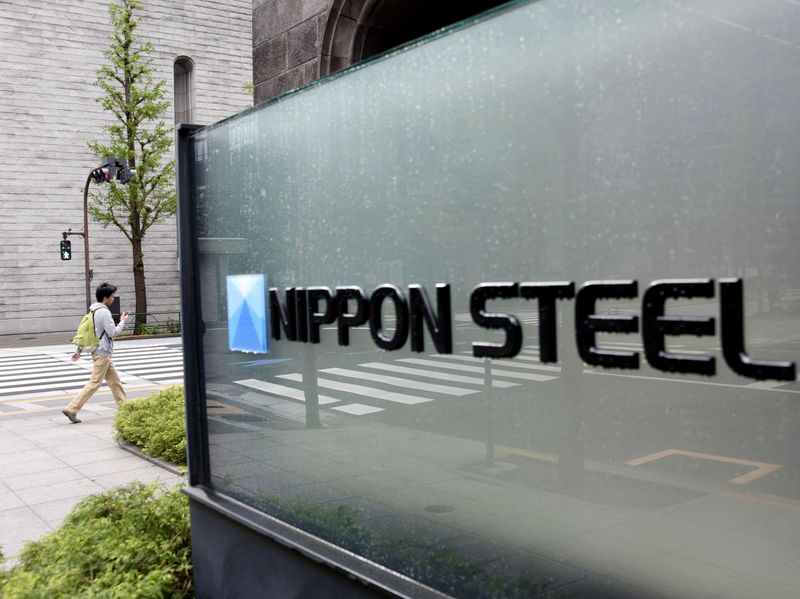By Andrea Shalal
WASHINGTON (Reuters) -The White House on Thursday said Nippon Steel Corp's $14.9 billion proposed acquisition of U.S. Steel Corp deserves "serious scrutiny," given the company's core role in U.S. steel production that is critical to national security.
In its first substantive statement on the deal, the White House said it viewed a strong domestic steel industry as vital to the U.S. economy and national security, and said it supported a careful review of the transaction by the Committee on Foreign Investment in the United States (CFIUS).
National Economic Council Director Lael Brainard said President Joe Biden welcomed manufacturers from the across the world investing in U.S. jobs and workers.
"However, he also believes the purchase of this iconic American-owned company by a foreign entity - even one from a close ally - appears to deserve serious scrutiny in terms of its potential impact on national security and supply chain reliability," she said in a statement.
Brainard said CFIUS was set up precisely to review this type of transaction, and the Biden administration would "be ready to look carefully at the findings of any such investigation and to act if appropriate."
The strongly worded White House statement comes amid growing criticism of the proposed deal by both Democratic and Republican lawmakers and the powerful United Steelworkers (USW) union, the main union at the third largest U.S. steel company.
Nippon Steel's U.S. and Tokyo representatives did not immediately respond to a request for comment. U.S. Steel said the two companies had notified the Treasury Department on Monday that they would voluntarily file for review by CFIUS.
"We respect the CFIUS process and will work with the appropriate parties for a thorough and successful review," the company said in response to a Reuters query.
"Japan is an important ally to the United States, and NSC currently operates multiple steel facilities across the USA," it said, noting that Nippon Steel had made substantial commitments to support U.S. Steel’s union and non-union employees.
"This will strengthen the American steel industry, American jobs, America's national security, and America's supply chain security," it said.
U.S. Steel's shares are trading well below the $55-per-share deal value, indicating investors anticipate that the political controversy around the deal could lead to delays.
USW President David McCall said the union shared many of the concerns expressed in Brainard's statement, including how the deal could affect the future of domestic steel production.
"U.S. Steel has made it clear, time and again, that its first and only priority is short-term financial gain for shareholders, even if this comes at the expense of workers, their communities and the nation's lasting capacity to continue meeting its manufacturing needs," he added.
Nippon said on Monday it would buy Pittsburgh-based U.S. Steel for $14.9 billion in cash, prevailing over rivals such as Cleveland-Cliffs (NYSE:CLF), ArcelorMittal (NYSE:MT) and Nucor (NYSE:NUE) in an auction for the 122-year-old steelmaker.
Brainard said Biden viewed U.S. Steel as an integral part of America's "arsenal of democracy" during World War Two and believed it remained "a core component of the overall domestic steel production that is critical to our national security."
Biden, heading into an election year, has made reviving U.S. manufacturing a key pillar of his presidency, and often hails the creation of 800,000 manufacturing jobs during his term.
Brainard said Biden had also taken action to protect U.S. steel companies against unfair and market-distorting trade practices in China and other countries, while supporting union jobs across the economy.
She said the administration was doing everything it could to ensure steelworkers could compete on a level playing field by fighting unfair trade practices.
Heino Klinck, a retired U.S. Army colonel who served as deputy assistant secretary of defense for East Asia under former President Donald Trump, said calling the deal into question on national security grounds could harm the U.S.-Japan alliance.

"It's unfounded. It could make us look hypocritical at best, and at worst, xenophobic," Klinck told Reuters, adding that he did not expect Japan to ever stand in the way of surging production to aid the U.S. Navy, a key U.S. Steel customer.
"The Japanese will be offended, and I think it will serve Chinese mis- and disinformation campaigning both in Japan and regionally," he said.